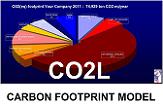Individuele CO2 rechten verminderen armoede in de wereld!
Individual CO2-rights reduce poverty!
Democratic CO2-emission rights
The world population is growing, economies develop, but still there is a lot of poverty. My idea is that CO2 trade may help to solve partly the development problems in the world. But there is one main condition: the property rights should be granted to the population of the world directly. Combined with the obligation of industries (oil and gas companies, mines, cement-industries, importers) that bring CO2 to the market may only sell their products if they can show that they have purchased sufficient CO2-emission rights, this would create a market for CO2-rights. So the basic producers of CO2-emissions then have to pass on the costs of the CO2-rights to their clients and this "wave" automatically would adapt producers prices to levels which include the burden of pollution.
In my opinion, the best way to implement a world wide system of carbon dioxide emission rights trade system is to grant the property rights of the emissions to individual world inhabitants. So each inhabitant of the world would be granted the same amount of property rights. By regulating the annual amount of property rights world wide (world emission ceiling) the carbon dioxide emissions can be controlled centrally. Each inhabitant then would receive the total amount of emission rights divided by the number of inhabitants on the world.
For 1990 (often used as a reference year) the worldwide per capita emissions of CO2 were as follows:

It can be seen that the average per capita emission is about 4 tons per year. So each inhabitant would receive an equivalent of 4.000 kg CO2-emission rights. As most of us do not pump oil, or have any other direct involvement in mining carbon fuels, we need to sell our rights on an (international) market for CO2-emission rights. Buyers would be the fossil energy companies that bring carbon on the market (as this would be the easiest way to control the rights).Selling your rights would not mean that you may not buy gasoline, gas to heat your house, etc. as the providers of these fuels may only sell fuel for which the emission rights are included (as it is currently with excise on fuels).
Example
Now let’s take an example:
* assume a price of € 50 per ton CO2;
* emission ceiling: 4 ton per capita;
* Imagine a family in Africa with 7 persons: they would have the right to emit 28 tons. Selling the rights for € 50 per ton would give them a total annual family income of € 1.400, almost € 4 per day. This can be used for food, or investing in a small business, etc. Given the low CO2-emissions per capita the internalised (costs of) CO2-rights in the products purchased by the family would only be 7 x 0.5 ton = 3.5 ton (or € 175). So the net gain for the family would be large;
* Now look at a Dutch family of three persons. On average they would emit about 24 tons (including intermediate emissions), but only have rights for only half of it. So the family would receive on an annual basis € 600, but indirectly spend € 1.200 on CO2-rights. In total all Dutch inhabitants would have to buy: 4 ton CO2 x 16 million inhabitants = 64 million ton CO2. This would generate an annual stream from the Netherlands to third world countries of about € 3.2 billion. The current budget for development aid of the Netherlands ("sustainable poverty reduction") shows almost € 3 billion for 2002! CO2-trade could either replace or supplement the Dutch development aid. For most OECD-countries CO2-trade would increase their net money transfer to the developing economies enormously.
Critical Remarks
What can be learned from this example? That individual rights may be a nice idea but also would trigger additional growth of the world population. That’s the last thing we want, so individual rights should be restricted to a maximum of for example 4 family members, which could lead to administrative problems in many countries (what is a family and so on).
The second critical remark could be that fossil energy would become much more expensive, this would thus harm the economy and thus development opportunities. Not only for rich "OECD-consumers" (of which many are used to pay high excises and energy taxes) but also for all companies (which often pay much lower or no excises or taxes) and (indirectly) for the poor. But a high carbon dioxide price would trigger innovations in the energy supply, as it would ascertain a constant high price for fossil energy use. This would help to achieve the greenhouse gas targets that the world faces. Most studies on the macro-economic effects show small negative and under certain circumstances positive effects, so the fear that the economy will be harmed by drastically reducing CO2-emissions is ungrounded.
A third critical remark could be that (almost) direct income support would not help development. But the CO2-rights are not only granted to the poor but to all, including the rich. For rich countries it would help to solve their environmental problems (as they would have to invest in cleaner energy/transport systems to avoid dependency of CO2), for poor countries a constant stream of large sums of money (over € 100 billion per year) would ease the pain for the inhabitants.
A fourth critical remark could be that in the current situation (The United States not part of Kyoto, poor administrative capacities in many countries, bureaucracy, corruption, vested interest of the energy industry, etc.) the proposed system is not feasible. This indeed will probably a huge obstacle to introduce the system as described. But on the other hand: why should the partners in Kyoto not (gradually) implement the system, and tax the outsiders?
Some will argue that the distribution of emission rights also should be linked to sinks of CO2-emissions. This indeed also is a problem that needs to be addressed further, although it looks that it can be solved by creating for instance a secondary market for "CO2-sink-rights".
People, planet, profit
How does a system of individual carbon dioxide emission rights fit into the concept of sustainable development: people, planet, profit?
For 1 billion people the additional income could be the difference between complete misery and a little hope. It would generate an enormous automatic additional income-transfer from rich to poor countries (>> € 100 billion per year). It would provide each inhabitant of the world with at least a small basic income (approximately € 0.5 per day). It would moreover create for each inhabitant of the world the notion of the seriousness of the greenhouse gas problems. The financial bonus on CO2-rights could also help to create a positive image of environmental concerns ("environment creates income as you become shareholder").
For the planet it could be an efficient way of dealing with greenhouse gasses. It would be a further extension of the already developed ideas on CO2-emission trading. The market that would be developed would imply that through the limitation of annual emission rights to be distributed could be implemented automatically by just monitoring the production of fossil fuels and assuring that this production is sustained by the purchase of emission rights. Existing customs and excise practices can be used as the basis for monitoring.
From the economic point of view the system would lead to an optimal and efficient allocation of CO2-rights. At least theoretically, it would be the most efficient (and cheapest) way to solve the greenhouse gas problem. It would trigger innovations towards a carbon extensive economy, it would help the development of alternative greenhouse gas free technologies of energy supply.
- - -
auteur: Jochem Jantzen
directeur Instituut voor Toegepaste Milieu-Economie
25-07-2002


